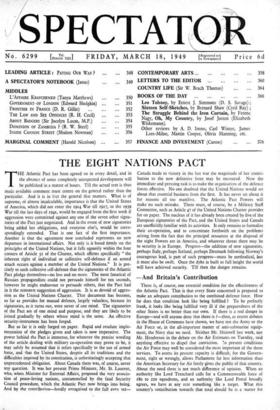THE EIGHT NATIONS PACT
THE Atlantic Pact has been agreed on in every detail, and in the absence of some completely unexpected development will be published in a matter of hours. Till the actual text is thus made available comment must centre on the general rather than the particular. And it is in fact the general that matters. What is of supreme, of almost incalculable, importance is that the United States of America, which did not enter the 1914 War till 1917, or the 1939 War till the last days of 1941, would be engaged from the first week if aggression were committed against any one of the seven other signa- tories of the Pact just negotiated. And in the event of new signatories being added her obligations, and everyone else's, would be corre- spondingly extended. That is one fact of the first importance. Another is that the agreement now concluded represents no new departure in international affairs. Not only is it based firmly on the principles of the United Nations, but it falls squaiely within the four corners of Article 51 of the Charter, which affirms specifically " the inherent right of individual or collective self-defence if an armed attack occurs against a member of the United Nations." It is pre- cisely to such collective self-defence that the signatories of the Atlantic Pact pledge themselves—no less and no more. The most fanatical of Russian propagandists could not persuade himself for ten seconds, however he might endeavour to persuade others, that the Pact had in it the remotest suggestion of aggression. It is as devoid of aggres- sion as the United Nations Charter. That document has become, so far as provides for mutual defence, largely valueless, because its signatories, as it turns out, were never of one mind. The signatories of the Pact are of one mind and purpose, and they are likely to be joined gradually by others whose mind is the same. An effective security-instrument has been forged.
But so far it is only forged on paper. Rapid and resolute imple- mentation of the pledges given and taken is now imperative. The power behind the Pact is immense, for whatever the precise wording of the article dealing with military co-operation may prove to be, it may safely be assumed that it refers specifically to the use of armed force, and that the United States, despite all its traditions and the difficulties imposed by its constitution, is unhesitatingly accepting that unprecedented obligation. About Canada there was, of course, never any question. It was her present Prime Minister, Mr. St. Laurent, who, when. Minister for External Affairs, proposed the very associa- tion of peace-loving nations, untrammelled by the fatal Security Council procedure, which the Atlantic Pact now brings into being. And by the contribution—hardly recognised to the full even vet— Canada made to victory in the last war the magnitude of her contri- bution to the new defensive front may be measured. Now the immediate and pressing task is to make the organisation of the defence forces effective. No one doubted that the United Nations would set about that essential business from the first. It has never set about it for reasons all too manifest. The Atlantic Pact Powers will make no such mistake. There must, of course, be a Military Staff Committee, such as Article 47 of the United Nations Charter provides for on paper. The nucleus of it has already been created by five of the European signatories of the Pact, and the United States and Canada are unofficially familiar with its activities. It only remains to formalise their co-operation, and to concentrate forthwith on the problems arising from the fact that the principal resources at the disposal of the eight Powers are in America, and whatever threat there may be to security is in Europe. Progress—the addition of new signatories, perhaps Italy, perhaps Iceland, perhaps Denmark following Norway's courageous lead, is part of such progress—must be methodical, but it must also be swift. Once the dyke is built to full height the world will have achieved security. Till then the danger remains.






































